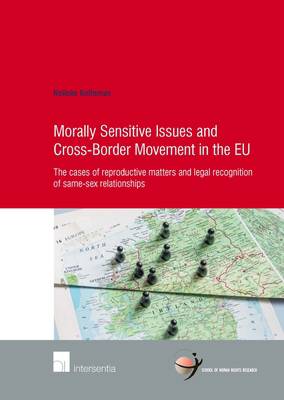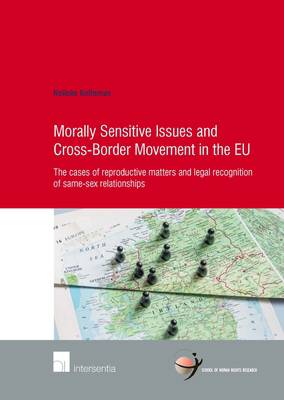
- Afhalen na 1 uur in een winkel met voorraad
- Gratis thuislevering in België vanaf € 30
- Ruim aanbod met 7 miljoen producten
- Afhalen na 1 uur in een winkel met voorraad
- Gratis thuislevering in België vanaf € 30
- Ruim aanbod met 7 miljoen producten
Zoeken
Morally Sensitive Issues and Cross-Border Movement in the EU
The Cases of Reproductive Matters and Legal Recognition of Same-Sex Relationships Volume 72
Nelleke Koffeman
€ 176,45
+ 352 punten
Omschrijving
Within the European Union there is considerable diversity in morally sensitive issues like legal recognition of same-sex relationships or reproductive matters, such as abortion, assisted human reproduction (AHR) and surrogacy. States generally expressly claim recognition of such diversity and it is explicitly respected at European level, even though the (implicit) influence of European law is increasingly visible in these areas.Cross-border movement within the EU adds a new dimension to this complex picture. It implies that States are increasingly confronted by (the consequences of) one another's regimes. For example, same-sex couples residing in one EU Member State claim recognition of their marriage concluded in another Member State, or women from Member States with restrictive abortion regimes resort to States with more liberal regimes. This research explores this cross-border dimension, identifies a number of pressing questions and provides insight into the interests that are at stake in such situations.This volume firstly investigates what if any standard-setting is in place in three national jurisdictions (Ireland, Germany and the Netherlands) as well as in the relevant European jurisdictions (EU law and the ECHR) in respect of reproductive matters and legal recognition of same-sex relationships, and how this has developed over time. This analysis inter alia provides insight into what considerations and interests play or have played a role in legislative debates and case-law, in what respects the regimes studied differ, and how European law has influenced national standard-setting. It furthermore provides the necessary basis for the subsequent analysis of how the relevant jurisdictions respond to cross-border movement in these areas and how they interact. While, for example, States sometimes appear to ward off cross-border movement in these areas to protect their national moral standards, in other situations they choose to or are obliged under European law to accommodate such mobility in order to protect the interests of vulnerable parties involved. This research thereby observes and clarifies the dynamics in decision-making regarding these issues, analysing and explaining how various areas and levels of law interact.
Specificaties
Betrokkenen
- Auteur(s):
- Uitgeverij:
Inhoud
- Aantal bladzijden:
- 726
- Taal:
- Engels
- Reeks:
- Reeksnummer:
- nr. 72
Eigenschappen
- Productcode (EAN):
- 9781780683492
- Verschijningsdatum:
- 4/11/2015
- Uitvoering:
- Paperback
- Formaat:
- Trade paperback (VS)
- Afmetingen:
- 170 mm x 240 mm
- Gewicht:
- 1306 g

Alleen bij Standaard Boekhandel
+ 352 punten op je klantenkaart van Standaard Boekhandel
Beoordelingen
We publiceren alleen reviews die voldoen aan de voorwaarden voor reviews. Bekijk onze voorwaarden voor reviews.











